Focus Factor Review – Should You Use It?
By: Rob Miller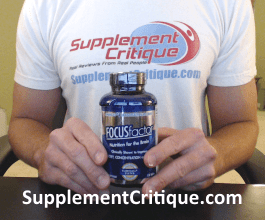
I get more and more requests from readers to look into nootropic supplements. These are the ones that boost your brain power, improve your memory and focus, and help keep you motivated to perform at your peak. If you haven’t heard about them yet, don’t worry, you will. They’re becoming all the rage and as such, more and more of them are popping up on the market. One option that you can pick up at a local drugstore is called Focus Factor, and that’s the one we’re looking at today.
Focus Factor approaches brain health maintenance from a wide perspective that includes vitamins, minerals, antioxidants, omega-3 oils, and botanical extracts. By using this approach, the benefits they say you can achieve include support for memory, concentration, and focus.
Click Hereto jump to our personal review of Focus Factor.
Focus Factor Ingredients and How They Work
The first part of the formula resembles a multivitamin and includes:
- Vitamin A
- Vitamin C
- Vitamin D
- Vitamin E
- Thiamin
- Riboflavin
- Niacin
- Vitamins B6 and B12
- Calcium
- Magnesium
- Zinc
- Chromium
- Iron
 The part of the formula devoted to brain health is proprietary, meaning they don’t share the ingredient amounts. It includes:
The part of the formula devoted to brain health is proprietary, meaning they don’t share the ingredient amounts. It includes:
- Bacopin which has been shown to improve memory in healthy adults.
- Phosphatidyl Serine which has also been shown to improve memory, but studies have only included patients with dementia up till now.
- Choline which is a neurotransmitter that provides the means of communication between different parts of the brain.
- Huperzine A which has also been studied and shown to improve memory in dementia patients.
- Vinpocetine which is another ingredient common in nootropic supplements for its ability to boost cognition.
Let’s talk a bit about what EXACTLY each of of these ingredients apparently do.
Vitamins B6 and B12
There have been a wide range of studies on vitamin B12, as it plays a crucial role in myelin sheath formation. Most people can obtain sufficient vitamin B12 levels from food alone, however, overall absorption reduces significantly as we age. This is why older adults need to either consume more vitamin B12 or receive a vitamin B12 shot.
In one study, it was shown that older adults with deficient levels both vitamin B12 and vitamin B6 experienced depression and suffered from attention issues.
There is also some speculation that a lack of vitamin B6 can promote Alzheimer’s, although there is no direct, definitive proof behind this theory. Either way, adults who consume more vitamin B6 have lower rates of Alzheimer’s.
Vitamin D3
There is a great deal of attention placed on vitamin D3 lately, as adequate levels are being correlated to good health overall. Since many adults and children alike don’t receive enough sunlight in order to adequately produce vitamin D3, supplementation is the next best option.
Low levels of vitamin D have been shown to result in memory issues and supplementation of about 800 IU have been shown to make a huge improvement. However, FOCUSfactor only contains 100 IU of vitamin D, not likely enough to promote a dramatic improvement.
Proprietary Formula
The proprietary formula weighs 692 mg which includes, DMAE, L-Glutamine, Bacopin, L-pyroglutamic acid, Phosphatidylserine, DHA, Choline, Inositol, N-Acetyltyrosine, Bilberry Fruit Standardized Extract, GABA, Grapeskin Extract And Activin (Grapeseed Extract), Vinpocetine, Trace-Lyte, Huperzine A, Boron Citrate, and Vanadium.
DMAE
DMAE, otherwise known as dimethylaminoethanol, has been studied in a wide variety of experiments related to brain and memory function.
These studies go all the way back to 1977 and all the way up to 2011, however, the consensus is that it doesn’t appear to have a positive effect on memory.
Based on these studies, including DMAE into a brain enhancement formula isn’t likely to show significant results.
L-Glutamine
People who are deficient in glutamine can benefit from supplementation, however, almost everyone receives sufficient amounts of this amino acids. In most cases, only vegans and vegetarians who undergo intense exercise end up deficient in L-Glutamine.
Bacopin (Bacopa Extract)
Bacopa, long used in Indian medicine, has been shown to improve cognitive function in humans. In one study in 2001, 300 mg a day improved learning and brain function after 12 weeks.
In addition, another study in 2010 demonstrated that Bacopa is effective in improving memory retention.
L-Pyroglutamic Acid
L-Pyroglutamic acid has been shown to improve memory in rats exposed to scopolamine, however, there isn’t much research on its effectiveness in humans.
Phosphatidylserine (PS)
Phosphatidylserine (PS) is a phospholipid that is typically found in the brain and has been shown to be especially important in proper cognitive function. Typically found in fish, supplementation has been shown to improve memory in elderly individuals. In addition, PS has been shown to lower cortisol levels, thus reducing stress.
Generally, 300 mg a day, split up into three different doses has been shown to prevent cognitive decline. In addition, mental processing speed, accuracy, and attention span have been shown to improve with PS supplementation.
Not only that but, PS has been shown to increase anaerobic running capacity, meaning that it could show promise in improving athletic performance.
DHA
DHA is one of the most highly sought after fish oils, as it has been shown to improve memory and reaction time in a 2013 study. However, in this study, 1.16 g were consumed every day for six months, while FOCUSfactor only has 692 mg in total in its proprietary blend. Therefore, people who consume FOCUSfactor aren’t consuming the amount of DHA that was shown to exhibit impressive results in regards to brain function.
Choline
Choline has been shown to increase cognitive function by providing the building blocks needed to create acetylcholine, a neurotransmitter that is associated with learning.
Choline is found in egg yolks so most people who eat eggs on a regular basis won’t have to supplement with it. However, its use in the FOCUSfactor formula makes sense from a learning and memory standpoint.
Inositol
Inositol is primarily a dietary supplement that has been used to increase fertility in women who have polycystic ovarian syndrome (PCOS). Inositol has also been shown to reduce anxiety and panic attacks.
Some studies have even shown that Inositol is able to reduce depression, acne, and bodyweight.
Due to the number of positive effects that Inositol has been shown to offer, it is being used in supplements with greater frequency.
N-Acetyltyrosine
N-Acetyltyrosine has been shown to increase cognition in a couple of studies. It also reduces stress, improves working memory, and improves well-being.
Bilberry Fruit Standardized Extract
Bilberry fruit has been shown to be effective as a neuroprotective agent. Since Bilberry Fruit Extract has been shown to reduce neurodegenerative diseases, its use in this formula makes sense. The reason why Bilberry is so effective in protecting brain tissue is due to its anti-inflammatory nature that reduces reactive oxygen species. In other words, Bilberry contains strong antioxidants that are beneficial in cognitive enhancement supplements.
GABA
GABA, a neurotransmitter, has been shown to allow the brain to move oxygen and nutrients more efficiently. In addition, GABA plays a role in memory formation and may make FOCUSfactor more effective.
Grapeskin Extract And Activin (Grapeseed Extract)
Grapeseed extract is a common ingredient in a wide range of supplements due to its overall health benefits. Grapeseed extract contains a huge amount of antioxidants and has been shown to increase blood circulation.
Vinpocetine
Vinpocetine has been shown to improve blood flow in the brain. Oftentimes, people who are suffering from dementia don’t have adequate blood flow so they aren’t able to move nutrients and oxygen into their brain cells. Through this method of action, Vinpocetine has been shown to improve memory.
In a 1987 study, 5 to 10 mg of Vinpocetine were shown to improve cognitive function when compared to the placebo.
Trace-Lyte
Trace-Lyte consists of water and a combination of minerals. Since many people are mineral deficient in today’s world, including minerals in any type of supplement is likely to offer benefits.
Huperzine A
Huperzine A is an ingredient that is growing in popularity in memory enhancement formulas. Since 100 µg of Huperzine A has been shown to improve memory in adolescents in one study in 1999, it is a logical addition into this supplement. In another study in 1995, 200 µg of Huperzine A per day was shown to improve memory in people who have Alzheimer’s.
Boron Citrate
Including boron citrate makes sense because many people are deficient in boron, a crucial mineral.
Vanadium
Vanadium is a trace element that is required by the body and according to new research, plays a role in brain function. In addition to treating Diabetes Mellitus, vanadium has been shown to improve learning and memory in rats.
The recommended dose is 4 Focus Factor tablets taken in the morning, with the option to take more as needed later in the day.
Focus Factor Side Effects
In one study on DMAE in Alzheimer’s patients in 1981, subjects showed confusion, drowsiness, and had an increase in blood pressure. People who are considering consuming DMAE should be aware of the potential side effects associated with it.
Huperzine A is not advised for those with heart disease, ulcers, emphysema, asthma, and epilepsy. The reason for this is because Huperzine A reduces the heart rate.
Bacopa also slows down the heart rate and shouldn’t be consumed by people who have asthma or emphysema.
Vinpocetine thins the blood, causing potential complications for people who are using other blood thinning agents.
Anyone who is thinking about taking Focus Factor should first consult with their doctor, especially if they have existing medical conditions.
Focus Factor Is Clinically Validated?
According to the company, Focus Factor is, “clinically shown to improve memory, concentration, and focus.”
So let’s take a closer look at this study that Focus Factor bases all their selling points on.
According to the company website, there is a clinical research study directly on Focus Factor, although this study is sponsored by the company.
In this study, 98 subjects, all healthy adults, took Focus Factor or a placebo for six weeks and were then tested on memory, concentration, and focus. The study came to the conclusion that the experimental group that took Focus Factor had improved capabilities across the board.
Since this study is not publish, not peer reviewed, and is clearly biased from the beginning, as it is sponsored directly by the company, how much weight does it really hold?
For a popular supplement like this, more peer review studies are certainly in order so accurate conclusions can be drawn and safety can be assessed.
Focus Factor Pros and Cons
Advantages of Focus Factor
- It can be used as a “multivitamin-plus” if you’re concerned about maintaining a high level of cognitive function.
- It’s available to pick up in stores.
- It’s very inexpensive compared to most nootropic formulas.
Disadvantages of Focus Factor
- The amounts of effective nootropic ingredients are not listed, and are probably quite low, given the price.
- Focus Factor reviews from customers are very mixed, and it seems like the happiest customers are the ones who went into it with low expectations.
Our Test Results
We had a guy named Steve Cronin, who tests out a wide variety of nootropic stacks and supplements, try Focus Factor. Below is what he had to say:
Other Customer Reviews
On Amazon, Focus Factor has a 3.9 out of 5 star rating. With over 582 customer reviews, it is safe to say that this rating is justified.
51% of reviewers gave Focus Factor a 5 star rating, while 13% gave this supplement a 1 star rating.
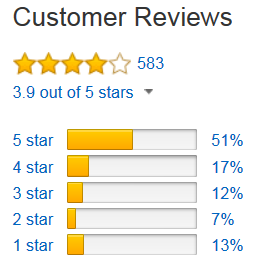
People who gave Focus Factor a 5 star rating claimed that they were able to remember names better and stated that their memory improved. Others are giving this supplement to children with ADHD, with great results.
Many say that Focus Factor has cleared up their brain fog so it certainly might be worth a try for almost anyone who is looking for optimal mental function.
On the other hand, people who are giving Focus Factor a 1 star rating claim that it simply doesn’t work or makes them feel jittery.
Other people believe that Focus Factor is simply a placebo and some have even stated that this product causes severe headaches.
In addition to headaches, others claim that they don’t like the smell of this supplement and state that it gives them stomach aches.
Where to Buy
You can purchase Focus Factor at stores like Costco, GNC, and Walmart, or online through several retailers. The price for the 150-count bottle is anywhere from $15-$30 so make sure you look around for your best option.
Conclusion
The idea of a multivitamin that also boosts your brain health seems like a no-brainer (pardon the pun). But only if it performs both functions well. If you’re just looking for a little mild support, Focus Factor may be perfect for you. Just don’t expect to see major changes.
Have You Used Focus Factor? Leave Your Review Below!
Top 3 NootropicsAffiliate Disclosure
Mind Lab Pro is a VERY effective nootropic for focus, concentration, short / long term memory, and more.
The Ultimate Nootropics Stack by Nootropics.com is one of the most effective stacks I’ve taken.
The combo of L-Theanine and Caffeine is a well known nootropic stack that really works.
Want To See What Supplements
Work Like Adderall? Click Here To Find Out!
Ask A Question
User Questions and Answers
While taking focus factor can you still take fish oil supplement? -Joseph
Yes. That's not a problem.- Rob



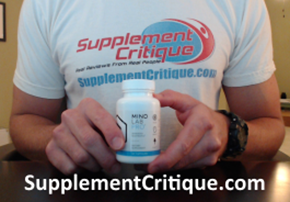
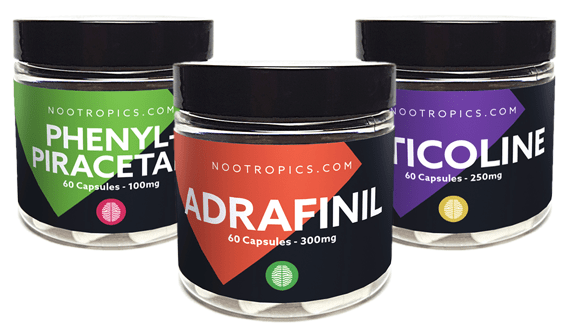
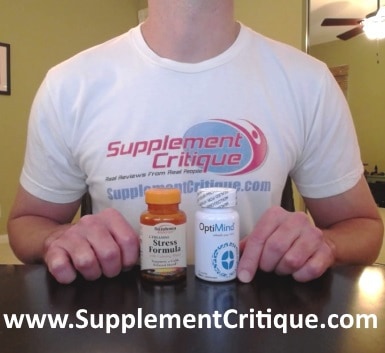


We’ve got reviews for Optimind and Focus Factor. Click on the links to check them out. I wouldn’t bother with Focus Factor. Optimind is my top pick, and it’s even closer to Adderall if you combine it with Phenibut. You can check out my article about using Optimind and Phenibut here. Just make sure to only use Phenibut a maximum of twice a week with several days in between.
Rob
SupplementCritique.com
Eventually, his doctors did diagnose him and started on various ADHD meds including Concerta and Vyvanse. They help him much better, but sadly he outgrows the doses and they have side effects.
When my 16 yr old nephew complained about not being able to focus at school, we purchased a bottle for him. He says it does help, though it takes 30 minutes or so to get into his system.
He is still using it 4 months later while he waits for his appt with a psychiatrist to determine what may help him further.
I’m glad to hear things are working out, but you want to be careful with giving these kinds of supplements to kids. Generally speaking, the ingredients haven’t been tested on people under 18, so we just don’t know what kind of effects they may cause.
Rob
SupplementCritique.com
I went from barely being able to remember measurements on a construction site, and making my boss angry due to him having to repeat himself. To running my own crew in a matter of 3 months..
The effects of the pills were dramatic at first til I came back to normalcy.. I hadnt remembered dreaming in several years.
Yet after a week on the product I was having vivid dreams every night..I DO use it as a muliti, with brain support.I am pleased with it, but if there are better products out there, I would like to try them..Im not where I was mentally 15 years ago. Would like to get that mentality to return..
Any advice or help is appreciated.. Thank you Rob for getting it tested, and giving an honest opinion..
Yeah we are still in the testing phase for Focus Factor, but we should have something up soon. So far, the best Nootropic supplement I’ve tested is Mind Boost, check out my review here: https://www.supplementcritique.com/mind-boost-day-and-night-formula-review/
Rob
SupplementCritique.com